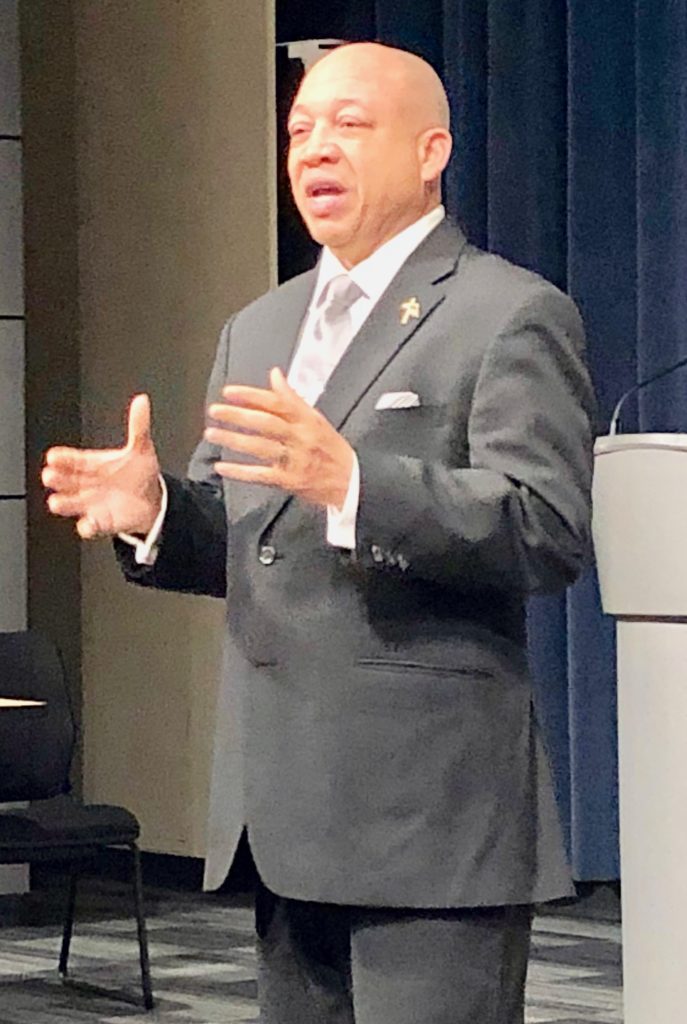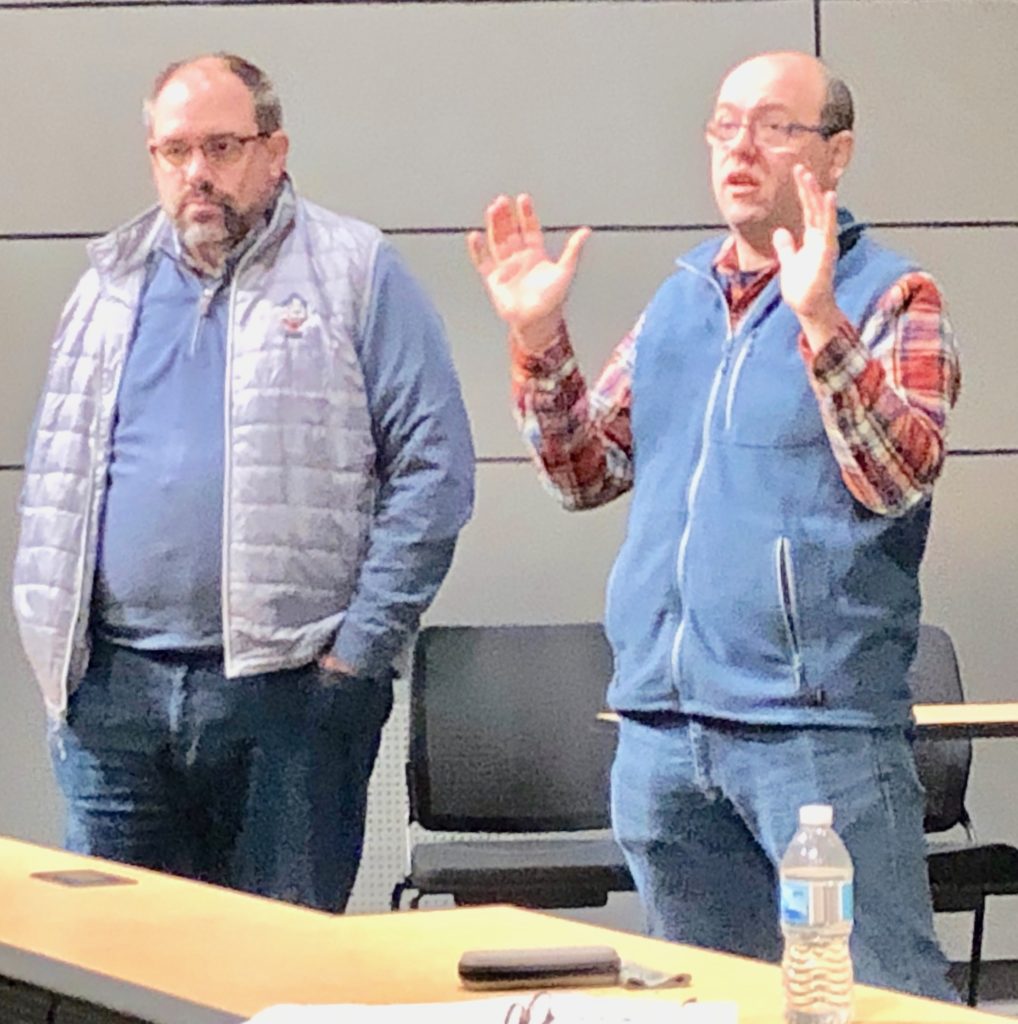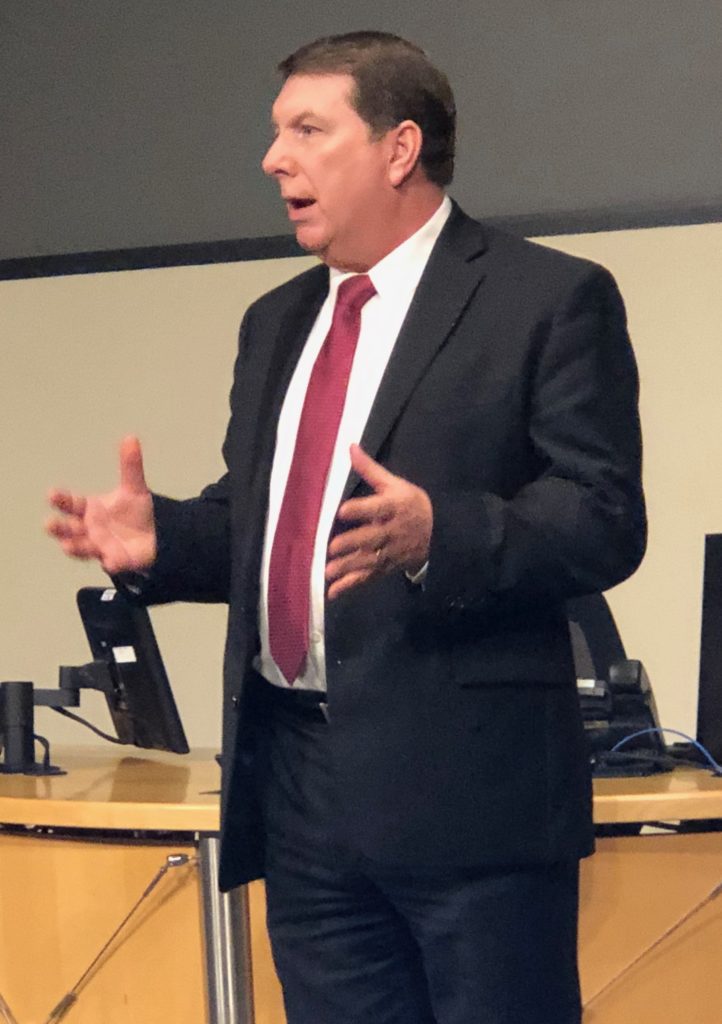By Jan Worth-Nelson
It was the night of the politicos Thursday at the November meeting of the College Cultural Neighborhood Association (CCNA), as the assemblage of about 50 residents heard from the city’s new mayor, the interim police chief, the state senator, the state representative, and the chancellor of the University of Michigan-Flint.
To top it all off, residents were bystanders to a brief brouhaha between two Flint City councilpersons, Council President Monica Galloway (Seventh Ward, including the CCN) and Kate Fields (Fourth Ward) over Galloway’s appointment of First Ward Councilperson and frequent council disrupter Eric Mays as Finance Committee chair.
Finally, Flint Community Schools board trustee Betty Ramsdell, a longtime CCN resident, summarized the travails of the financially beleaguered district, concluding with a plea, “The lives of those 3,700 kids depend on us…we can’t let these kids be throwaways.”
Some highlights:
— Newly elected Mayor Sheldon Neeley, coming off his second full week in office, promised residents “You will see a difference — a willingness to work together with City Council, with a level of respect.”

Mayor Sheldon Neeley addressing the CCNA Thursday night (Photo by Jan Worth-Nelson)
Noting that he had served with State Senate Minority Leader Jim Ananich on the Flint City Council and that Ananich shares his birthday, Neeley said, “We learned how to work together and how to use the cerebral power between us.”
Neeley confirmed that Fire Chief Raymond Barton is staying onboard; that Phil Hart has been hired as interim police chief replacing Tim Johnson who resigned; that Tyree Walker will be interim director of human resources, on loan from Hurley Hospital; that John Daly will be director of transportation infrastructure; that Eric Scorsone will help assess the city’s financial situation “in a transparent manner.”
Statute of Limitations on water crisis
— State Senate Minority Leader Jim Ananich and State Representative John Cherry, both of whom are residents of the CCN, appeared together to update residents.
Perhaps of most significance, they confirmed they are moving forward with a bill to extend the statute of limitations in criminal misconduct charges against public officials from six to ten years.

Jim Ananich (left) and John Cherry at the November CCNA meeting (Photo by Jan Worth-Nelson)
The context is that last June the state dropped all charges against eight public officials implicated in the Flint water crisis. In light of the discovery of additional evidence possibly pertinent to the crisis, Michigan Solicitor General Fadwa Hammoud and Wayne County Prosecutor Kym Worthy have said they needed more time to review the evidence and consider whether to re-issue indictments.
The current statute of limitations would expire in April 25, six years after Flint’s water supply was switched to the Flint River — and the date the alleged crimes were said to begin.
Commitment to respect in the Flint PD
— Interim Police Chief Phil Hart, also a CCN resident, echoed Neeley’s commitment to be respectful in the city’s law enforcement practices and said he had moved the chief’s office from near the mayor’s suite in City Hall back to the police department, where he said he can keep a closer eye on day-to-day operations and get to know the city’s 94 police officers and support staff better.

Interim Police Chief Phil Hart (Photo by Jan Worth-Nelson)
Hart emphasized many law enforcement events intersect with mental illness and bemoaned the frequency with which the mentally ill “get shoved into the law enforcement system” where jails are overcrowded and not designed to address mental illness. He called for a “mindful” approach to that problem and more funds directed to assisting the mentally ill. He also stressed that skillful communication is crucial in potentially violent situations. He said, “I’ve been shot at three times and never shot back. I’ve never had to fight with anybody” and advises his officers to “be respectful.”
About those helicopter fly-overs
Hart prompted wry laughter when asked about frequent fly-overs by the state police helicopters which many residents find annoying.
“I think I owe you an apology. Those guys know I live (on Blanchard) and sometimes I think they’re shining me,” he said.
He said the helicopters assist with chases more effectively and more safely than patrol cars, and thus are welcome in certain situations. Then he stated the helicopters patrol regularly, even when there is no crime, and that he would be willing to inform residents of that schedule.
Threatened Pierce School closing part of larger, dire challenges
Late in the two-and-a-half-hour meeting, residents heard from Flint Community Schools board member Betty Ramsdell, also a resident of the CCN, who addressed concerns about the ongoing financial challenges of the district–including the proposed closing of Pierce Elementary, a much-loved center within the College Cultural neighborhood.

Flint School Board member Betty Ramsdell describing severe challenges to the Flint Community School district (Photo by Jan Worth-Nelson)
She said, “Right now, no schools are being closed,” and, in summarizing the district’s dilemma of having to repay a $20 million loan and facing a possible $5 million deficit this year, added, “You can’t cut yourself out of a deficit.”
Explaining how the district has lost thousands of students, from 48,000 in the city’s heyday in the 60s, to 16,000 students only eight years ago, to about 3,700 this year, she said that after the boom times when many new schools were built, “We had to consolidate because there weren’t enough students.”
Those severe decreases have led to drastic declines in state funding, competition with charter schools that leave the FCS “getting the short end of the stick,” particularly in coping with special needs students.
She said since the water crisis, the percentage of special needs students in the district has skyrocketed from between 5 and 8 percent to 30 percent.
“We’re educators–we want to help everybody,” she said, but emphasized the financial pressures on the district to deliver what is needed are being severely strained.
“Those kids can’t be throwaways,” Ramsdell pleaded. “The lives of those 3,700 kids depend upon us.”
Squabble over Eric Mays
The two Flint City Council members present, while ostensibly bringing residents up to date on council business, veered into a mutual attack. Fields, whose Fourth Ward adjoins the Seventh and often attends CCNA meetings, criticized Galloway for appointing a man who she said owes back taxes and cannot handle his own finances. She was joined in the critique by CCNA resident Mary Lazar, who shouted at Galloway, “Are you the person who appointed Eric Mays as chair of the Finance Committee?”
When Galloway said “Yes,” Lazar replied. “That was very poor judgement.”
Mays was removed as Finance Committee chair once already, in January, following months of discord.
Galloway, who was recently elected council president, replied to Lazar and Fields that if problems emerge, as council president she has the right to remove the finance committee chair. But she added, “In appointing him I was hoping Councilman Mays would be the leader that he said he could be.”
The back and forth led to complaints from both council members about the other, until a resident and CCNA president Mike Keeler called a halt.
UM – Flint Chancellor joins the neighborhood
The new chancellor of the University of Michigan – Flint, Debashish Dutta, introduced himself as a new resident of the neighborhood. He and his wife, Fataneh Taghaboni-Dutta, have moved into UM – Flint’s Ross House at the corner of Court Street and Woodlawn Park Drive.
Dutta, an engineering professor, came to UM – Flint from Rutgers University — New Brunswick, where he was chancellor. But the move to Flint was a return, he explained, after ten years, to the Wolverine State. He had begun his career at UM – Ann Arbor and his wife, a professor of business administration, had spent 19 years in the UM – Flint School of Management.
“We are very pleased to be back, and we look forward to being a part of this community and participating in the revitalization of this great city,” Dutta said.
EVM Editor Jan Worth-Nelson can be reached at janworth1118@gmail.com.


You must be logged in to post a comment.